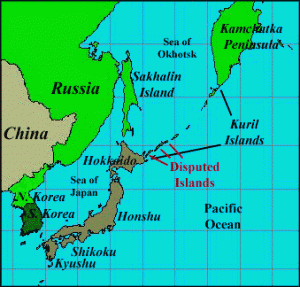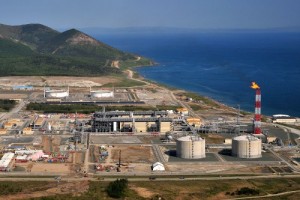A consultant with Japan’s largest gas company said they are interested in building a $3.5 billion pipeline to obtain Russia’s natural gas at half the cost of its LNG
Tokyo Gas, Japan’s largest gas company, would like to build a gas pipeline from Sakhalin, Russia, to central Japan, Shigeru Muraki, a consultant for the company, said at the third annual Russian-Japanese Forum on Cooperation in Business, Technology and Culture in Tokyo. Muraki said the 1,500 long pipeline would cost $3.5 billion, reports Russia Beyond The Headlines.
According to Muraki, this pipeline would offer an economical alternative to liquefied natural gas (LNG). The Tokyo Gas consultant said that the pipeline gas would cost half as much as the LNG Japan currently imports from Russia, even considering the costs associated with building the pipeline.
Last year, supplies of Russian LNG cost an average of $788 per ton ($579 per 1,000 cubic meters). In comparison, Gazprom’s (ticker: OGZPY) average pipeline supplies to Europe cost $350 to $380 per 1,000 cubic meters.
“In February 2015, while oil prices were declining, the price of liquefied gas already fell to $614 per ton ($451 per 1,000 cubic meter),” says Sergei Agibalov, Deputy Director of the Economic Department at the Institute of Energy and Finance, in Moscow.
Agibalov estimates that, even considering the costs of the pipeline’s construction and Gazprom’s unwillingness to lose revenue, the pipeline gas supplied to Japan would cost less than $400 per 1,000 cubic meters.
Japan is the largest importer of Russian liquefied gas. In 2014, Japan bought 80% of the LNG produced from Gazprom’s Sakhalin-2 LNG project. The
Sakhalin-2 project is located on the far east of Russia, on Sakhalin Island. In 2014, Sakhalin Energy projects produced 10.8 million tons of LNG, according to Gazprom.
A pipeline may not be a possibility
The construction of an underwater pipeline to Japan presents serious risks, says Rustam Tankaev of the Russian Union of Oil and Gas Industrialists. “This is a seismically dangerous region,” he said. “All the studies done on building a pipeline to Japan resulted in negative conclusions.”
The Japanese, however, believe that the project can be done safely, citing the construction of submarine tunnels that connect the Japanese islands.
The hurdles facing the project are more than just seismic though, says Alexei Grivach, Deputy Director of the National Energy Security Foundation. “The Japanese market is built on local segments, which are not connected,” explained Grivach, making gas supplies more difficult.
The project might also seem less attractive to Gazprom, which has greater flexibility through LNG shipments, says Vice President of the Argus Agency Vyacheslav Mischenko. The pipeline would tie Russia to Japan. “The idea [of LNG] is more attractive from a strategic or geopolitical viewpoint,” said Mischenko. “By using ships, Gazprom can change the direction of the supplies, something that cannot be done when there is a pipeline.”
An about-face
The numerous obstacles being thrown up in opposition to a Russia-Japan gas pipeline are a change from last October, when Russia proposed a pipeline from Sakhalin to the northern Japanese island of Hokkaido, reports Reuters.
That pipeline faced its own difficulties, including a dispute over islands taken by Russian forces at the end of World War II that prevented Moscow and Tokyo from signing a formal peace treaty, and Western sanctions against Russia over the conflict in Ukraine.
Important disclosures: The information provided herein is believed to be reliable; however, EnerCom, Inc. makes no representation or warranty as to its completeness or accuracy. EnerCom’s conclusions are based upon information gathered from sources deemed to be reliable. This note is not intended as an offer or solicitation for the purchase or sale of any security or financial instrument of any company mentioned in this note. This note was prepared for general circulation and does not provide investment recommendations specific to individual investors. All readers of the note must make their own investment decisions based upon their specific investment objectives and financial situation utilizing their own financial advisors as they deem necessary. Investors should consider a company’s entire financial and operational structure in making any investment decisions. Past performance of any company discussed in this note should not be taken as an indication or guarantee of future results. EnerCom is a multi-disciplined management consulting services firm that regularly intends to seek business, or currently may be undertaking business, with companies covered on Oil & Gas 360®, and thereby seeks to receive compensation from these companies for its services. In addition, EnerCom, or its principals or employees, may have an economic interest in any of these companies. As a result, readers of EnerCom’s Oil & Gas 360® should be aware that the firm may have a conflict of interest that could affect the objectivity of this note. The company or companies covered in this note did not review the note prior to publication. EnerCom, or its principals or employees, may have an economic interest in any of the companies covered in this report or on Oil & Gas 360®. As a result, readers of EnerCom’s reports or Oil & Gas 360® should be aware that the firm may have a conflict of interest that could affect the objectivity of this report.



